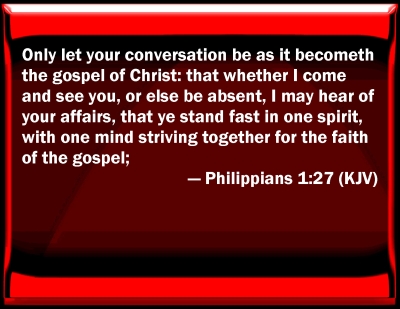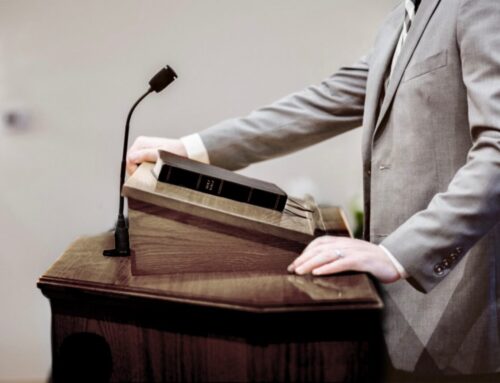“We are not taking any risks when we step out on the Word of God. Forever it is firm, fixed, tried, and true.”
~Vance Havner
Press Through To Jesus!
By Vance Havner
Bring Him hither to me.
Matthew 17:17
The disciples had failed to cast out demons from this poor boy, but Jesus never fails. How good to know that when men fail and churches fail, we can still get through to Jesus. Back of all the fads and isms, the failure of the saints and the impotency of some churches, He stands, the same yesterday and today and forever.
You will find what you need in Jesus. Not in that book which you hope will reveal some magic open sesame on the next page. Not in some group or denomination that seems to have just what you’ve been looking for. Not in some self-induced experience you’ve been trying to work up. Not in a pet preacher or favorite cause or doctrine. All these will disappoint you. Our Lord said of the hungry multitude, “They need not depart.” You never need to leave Jesus for anything. He is Alph and Omega-and all the letters between-so you need not go outside His alphabet to complete the wording of your life.
All that is true and in any book or movement or group or doctrine or experience is already in Christ. Get through to the Source. “By him all things consist.”
“I’m A Stranger Here”
By Vance Havner
Dearly beloved, I beseech you as strangers and pilgrims, abstain from fleshly lusts, which war against the soul.
I Peter 2:11
A stranger does not feel at home where he is, and neither does a Christian in this world. He is not a citizen of earth trying to get to heaven but a citizen of heaven sojourning on earth. This world is “his passage, not his portion.”
We of the Heavenly Commonwealth do not feel at home here, we just “don’t belong.” We speak another language. When the cocktails are offered we refuse and when the dirty jokes are told we do not join the laughter, not because of a Pharasaic self-righteousness but simply because we are “strangers.” It is not always comfortable to be a “foreigner.” And they will think it strange if we don’t “make ourselves at home” (I Peter 4:4), especially if we once took part with them.
The world will do its utmost to make us “one of the crowd.” Nothing is more insidious than the hospitality of this age. But, while we need not be discourteous, we must not be deceived.
“Prayer may not get us what we want, but it will teach us to want what we need.”
~Vance Havner
I Am Small; God Is Big
December 1, 2014
“I am unworthy of all the kindness and faithfulness you have shown your servant. I had only my staff when I crossed this Jordan, but now I have become two camps.” — Genesis 32:10
The Torah portion for this week, Vayishlach, which means “and he sent,” is from Genesis 32:4—36:43, and the Haftorah is from Obadiah 1:1–21.
This week’s Torah portion begins with a fear-filled Jacob. He was on his way back home with his family, knowing that a confrontation with his brother Esau was unavoidable. It had been 22 years since Jacob had fled Canaan because he feared his brother would kill him after he discovered that Jacob had posed as Esau to get their father’s blessings. Esau was a dangerous and powerful man who could easily slaughter Jacob’s entire family. Jacob was shaken to the core.
And so, as we should all do at times of intense fear, Jacob prayed.
Toward the beginning of Jacob’s prayer, he said, “I am unworthy of all the kindness and faithfulness you have shown your servant.” In Hebrew, the verse begins with the word “Katonti,” which literally means “I am small.” Jacob reflected upon his smallness, his inability, and his unworthiness. How is this an appropriate way to prepare for his biggest life challenge so far?
A few years ago, popular Jewish singer-songwriter Yonatan Razel was riding the waves of fame when tragedy struck. His daughter, Rivkah, fell off the roof of the family’s Jerusalem home while watching the Independence Day fireworks. Rivkah was unconscious for weeks, and at times, it seemed that there was almost no chance that she would ever wake up. Yonatan describes the day that things turned around. His brother had left him a note that said, “Have you prepared for the great miracle that God has in store for you today?”
Yonatan says that the note shook him and he understood deeply that each day is a miracle from God for which we must be grateful. Yonatan understood that just as God performs miracles for us daily, even while we are undeserving, God could bring about the miracle that he needed most on that day. And on that very day, hope prevailed over despair, and Rivkah took the first significant steps that ultimately led to her complete and miraculous recovery.
Serendipitously, just before Rivkah’s accident, Yonatan had composed a new song with the words of Jacob’s prayer: “I am unworthy of all the kindness and faithfulness you have shown your servant.” Like Jacob, Yonatan came to realize that while he was small, God was big – and that’s what gave him strength.
Friends, when we realize how small we are, we recognize how great our God is. We realize that it is God, not us, who protects and provides for us every day. We need not despair in the face of great challenges. Just as God performs countless miracles for us every day, He can bring about the miracle that we need most on this very day.
With prayers for shalom, peace,
Rabbi Yechiel Eckstein
The words theme: Family
Hebrew Word
of the Day
Ben
(Meaning: Son)
Living a Dedicated Christian Life
by Pastor John Fredericksen
Why do missionaries leave their families and native country to labor in distant lands? Why do Christian workers (teachers, secretaries, etc.) labor in ministries instead of working in higher paying positions in the world? Why do most believers cheerfully give from their income to the local church when they could spend it on things of pleasure? Why do Sunday School and Bible teachers sacrifice their time to prepare for their ministry to the saints instead of using that time for leisure? Why do so many believers make it a priority to set aside time to consistently be in Bible class, the preaching hour, and mid-week prayer and study services when they could choose to spend this time at work or play?
The answer to the above questions is found in II Corinthians 4:18: “We look not at the things which are seen, but at the things which are not seen: for the things which are seen are temporal; but the things which are not seen are eternal.” You see, a truly spiritually minded believer does NOT simply live for this life alone. Instead, he weighs his present actions and choices from a heavenly and eternal perspective of gain or loss. He is able to look at today’s time, ministry, finances, and choices as an opportunity to invest in eternal future reward, and he is motivated to do so with consistency, diligence, and joy.
How have you been looking at your life? Have you been only looking at the “things which are seen,” or have you been looking at, and valuing most highly, the things which are eternal? This may be a good day to change focus and priority.
“There is only one Christian life and that is Christ Himself, but He lives it again and again in all who receive Him.”
~Vance Havner
Love-Impelled Invasion
By A.W. Tozer
Real faith must always mean more than passive acceptance. It dare mean nothing less than surrender of our doomed Adam-life to a merciful end upon the cross. That is, we own God’s just sentence against our evil flesh and admit His right to end its unlovely career. We reckon ourselves to have been crucified with Christ and to have risen again to newness of life. Where such faith is, God will always work in line with our reckoning. Then begins the divine conquest of our lives. This God accomplishes by an effective seizing upon, a sharp but love-impelled invasion of our natures. When He has overpowered our resistance, He binds us with the cords of love and draws us to Himself. There, “faint with His loveliness” we lie conquered and thank God again and again for the blessed conquest. There, with moral sanity restored, we lift up our eyes and bless the Most High God. Then we go forth in faith to apprehend that for which we were first apprehended of God.
“I thank Thee, 0 Father, Lord of heaven and earth, because Thou hast hid these things from the wise and prudent, and hast revealed them unto babes. Even so, Father, for so it seemed good in thy sight.”
Verse
I have been crucified with Christ and I no longer live, but Christ lives in me. Galatians 2:20
Thought
Real faith must always mean more than passive acceptance. It dare mean nothing less than surrender of our doomed Adam-life to a merciful end upon the cross.
Prayer
We thank You, Father, that You have hid these things from the wise but have revealed them to us, Your grateful children.
On Planning Your Peniel
By Vance Havner
And Jacob was left alone and there wrestled a man with him until the breaking of the day.
Genesis 32:24
It is not in some favored vacation spot, where the setting seems perfect, that we have our best season with the Lord. We do not find our Bethels where we recharge our spiritual batteries in some ideal retreat. It was in desperate loneliness at Jabbok that Jacob met the Lord and gained power with God and men. At the backside of the desert Moses came to the mountain of God. It was in the year that King Uzziah died that Isaiah saw the Lord. Do not forget that John wrote Revelation on Patmos, that Pilgrim’s Progress came from Bedford jail, and precious hymns from Fanny Crosby’s blindness.
Our choicest art and literature came out of poverty and suffering, and God does His best work with us oftimes when it seems that the time and place are most unpropitious. We do not come to know the deeper things by rocking on the porch or some lazy rest spot, sipping lemonade, reading a novel.
You cannot set the stage and arrange the scenery and then work up the experience you need-have it made to order. The Spirit does not work that way. “The wind bloweth where it listeth.” It may be in the unlikeliest place and on the darkest day when you are “left alone” that God will come down to wrestle until daybreak.
The Wonder Cure
by Pastor Cornelius R. Stam
Most of us remember the drugstore product which swept the country like wildfire years ago and netted one man more than $3,000,000.00 in one year. It was called Hadacol. Whatever was wrong with you, Hadacol could cure it! Radio commercials and newspaper advertisements acclaimed its healing powers. Some small drugstores displayed signs over their doors reading, “MAIN ENTRANCE FOR HADACOL.”
One humorous story was told at that time about a woman who was supposed to have testified over the radio: “Before I began taking Hadacol I couldn’t read nor write; now I’m teaching high school!”
Some people seem to think that Christianity is like Hadacol was supposed to be. In fact, some evangelists give the erroneous impression that if one accepts Christ everything will suddenly go right. Nothing could be farther from the truth. The Christian life is a battle, and we cannot win this battle without much diligent, earnest Bible study and prayer. In fact, it is this battle that makes the Christian life rewarding. Formerly we were “taken captive by [the devil] at his will” (II Timothy 2:26), but now God provides us with complete armor, including “the sword of the Spirit” and “the shield of faith” (Ephesians 6:16,17), and says, “Stand fast.” Indeed, James 4:7 says: “Resist the devil, and he will flee from you.”
God has enlisted every true believer in His “armed forces,” as it were, and He encourages us each one to be “a good soldier of Jesus Christ” (II Timothy 2:3). Indeed, He expects this of each corporate assembly of believers as well, for Paul, by divine inspiration, wrote to the Philippian saints:
“Only let your conversation be as it becometh the gospel of Christ: that whether I come and see you, or else be absent, I may hear of your affairs, that ye stand fast in one spirit, with one mind, striving together for the faith of the gospel” (Philippians1:27).
Like an Olive Tree
December 7, 2014
But I am like an olive tree
flourishing in the house of God;
I trust in God’s unfailing love
for ever and ever. — Psalm 52:8
I was recently thinking about two incidents that occurred in Israel on the same day this year. One was reported widely by the media, and the other went mostly unnoticed. The first event was a terrorist attack in Jerusalem. An Arab motorist plowed his vehicle through a group of innocent people waiting at a train stop. He killed one person and seriously injured several more.
After slamming into a second group of civilians, the terrorist emerged with a metal bar and began beating innocent men, women, and children until, thank God, security forces were able to neutralize him. My friend commented, “What kind of human being wakes up in the morning and plans to kill and maim as many innocent people as possible?”
The second event that occurred was very different. I received an e-mail from a man who, later that same night, was on Jerusalem’s light rail. He noticed that one of the security men on the train had two large thermoses and a bunch of hot cups. At each stop, the man would fill the cups and hand them to the other security men working the nightshift on each platform. Quietly, that man warmed many bodies and even more hearts on that cold autumn night.
In Psalm 52, David addressed another cruel man. David wrote this psalm when Doeg, one of King Saul’s officers, informed the king that the city of Nob, under the leadership of Ahimelek, had given David refuge. David was a wanted man by Saul, and so Saul had the entire city wiped out. Doeg and his men slaughtered an entire city of innocent men, women, and children. In the psalm, David wondered how Doeg could be so proud of his actions, calling Doeg a man who loved evil.
David concluded the psalm by saying, “But I am like an olive tree.” An olive tree is firmly rooted in its place. It quietly provides shade and its fruit gives forth nourishment; as oil, it gives off warmth and light. No matter how evil the people around David became, he vowed to remain firmly rooted in the Lord. No matter what else was happening around him, David would continue to extend a hand of peace and to behave toward others with kindness.
Friends, David’s response to senseless cruelty must be ours as well. Like the man on the train, we must be beacons of light in a dark world. Today, let’s each do one extra act of kindness. No matter what anyone else may do today, we must continue to be like an olive tree – ceaselessly providing shelter, nourishment, warmth, and light, wherever we may go.
With prayers for shalom, peace,
Rabbi Yechiel Eckstein















Leave a Reply, please --- thank you.